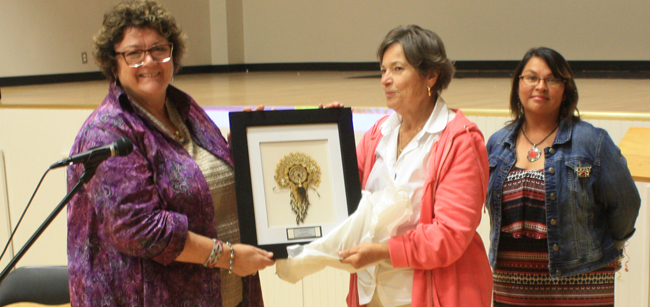Educating the educators in Serpent River

By Leslie Knibbs
Serpent River First Nation Daycare and Education Department hosted a day-long workshop and evening presentation from Dr. Jean Clinton, renowned author and advocate of children’s issues on September 14. Over 90 people gathered at Serpent River First Nation Lifestyle Centre to learn about toxic stress and the effects on children.
Educators and childcare workers from local schools and daycares as well as others from Wawa and Temagami attended the event.
Organizers for the event, SRFN Daycare Director Buffy Johnston and Education Administrator Karel Grant continue to provide cutting edge lifelong learning to educators and childcare workers in their mission to build a healthy community, one child at a time as they did in 2013, when they brought in perhaps the most renowned world expert on children’s development.
Two years ago, Serpent River First Nation (SRFN) were fortunate enough to have Barbara Coloroso visit their community to speak to educators and childcare workers. Coloroso, is an international bestselling author and for the past 38 years an internationally recognized speaker and consultant on parenting, teaching, school discipline, positive school climate, bullying, grieving, nonviolent conflict resolution and restorative justice. This year, SRFN continued their mission to provide lifelong learning to child care workers by bringing in another international advocate for children’s issues.
This year, Dr. Clinton, an Associate Clinical Professor in the Department of Psychiatry and Behavioural Neurosciences at McMaster University visited SRFN telling early childhood educators, childcare workers and teachers that development of a child’s brain is not “just shaped by our genes,” but rather “sculpted by a lifetime of experiences.” Clinton, told those attending the brain is changed by the environment, especially in young children. To illustrate her meaning she told the story of twins who were separated at an early age and after meeting in their twenties, after living apart, the two identical twins were unique in their own way. Continuing with her theme, explaining the brain’s plasticity, Clinton noted the trauma caused to children taken away from their parents an placed in Mission schools as opposed to those who lived in a healthy family environment.
“Childhood experiences build the brain and build the reactivity of the stress system, and the damaging impact of that may not be shown for many, many years,” said Clinton. “In its simplest terms, high stress triggers the emotional reaction centre of the brain and the ‘fight or flight’ mode that boosts heart rate, adrenalin and releases cortisol.” According to Clinton, one brain area most sensitive to high cortisol is the hippocampus; this plays a critical role in new learning and memory. Being in a continuous state of high alert diverts energy and interferes with activity in that learning centre. The result of this ‘fight or flight’ mode is “toxic stress.”
Dr. Clinton said the traditional way of viewing children and learning was to look at children as “empty vessels to fill with what we know is best” for them. Clinton stated “children are powerful resourceful creators” who must be connected to “in a warm and responsive way.” She stated that when this is done, there is “less need for correction and directing.” Referring to teaching, Dr. Clinton said “teachers should be making the classroom a place where students want to be.” “Relationships and the power of connection is the key,” she emphasized.
Those attending heard the old view of the brain development was, the brain is a fixed structure made up of a set number of cells which decline with the aging process and damage or trauma. Clinton shared the new scientific view that the brain’s plasticity allows the growth of new cells and is making connections throughout life. “The brain and body experiences alters the structured connection in the brain, strengthening and growing” throughout life.
When asked what she got out of the presentation, one early childhood educator said, “I got a greater understanding of how to reach children who need help the most and understand how the impact of stress and bullying does affect children in a very negative and real way. It left me with a desire to advocate for affected children and do my best to make a positive difference in their lives.”
With Dr. Clinton’s visit to SRFN, the education department and daycare continue in their ongoing effort to teach and enlighten childcare workers with up to date knowledge on building healthy communities on child at a time.
Following the evening presentation, Dr. Clinton was gifted with a framed piece of bead art by Anita Pelletier of SRFN. Lead organizer of the event, Buffy Johnston, Director of SRFN Daycare, and, Education Administrator Karel Grant made the presentation.

